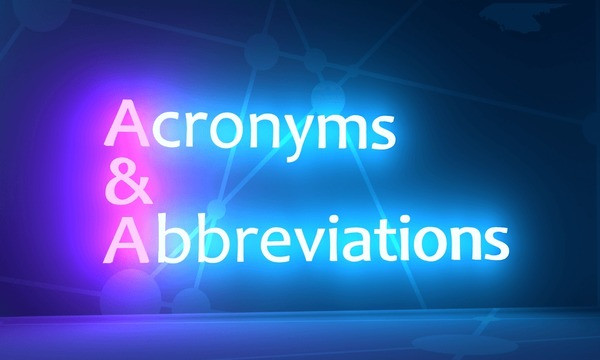
 Abbreviations and acronyms in English are an integral part of communication between people who facilitate and accelerate the exchange of information, but their understanding and use can become a challenge for those who only teach a foreign language. Acronyms in English are almost the same as abbreviations, only more remedies on independent words. Unlike abbreviations, they can consist of the first letters of a long name and read, as a whole word instead of the pronunciation of each letter separately. In addition, in these words, after each letter there is no dot. Abbreviations are short forms of the word or group of words that are created by removal or decreasing the number of certain sounds or letters. They are used for convenience and saving space, as well as for the rapid identification of terms or concepts. All letters in abbreviations are usually read separately, as in alphabet (for example, USA, UK). That is the exception when the letters are read together (NASA reads "NASA"). And some abbreviations are read by the rules of vocabulary or terminology. For example, "CEO" (CHEIF EXECUTIVE OFFICER) can be read as the letters in the alphabet. Another category is a reduction in words. They also make the language more efficient, using less space and provide greater expressiveness. An example is "TV" full name "Television" or "Info" - "Information". Abbreviations and reductions depict important aspects of culture and customs of various groups of people who promote rapid and effective exchange of information. Consequently, there are some common examples of shortenings: VIP (Very Important Person); DIY (Do IT Yourself) - Make yourself; CEO (Chief Executive Office) - Chief Executive Officer; ETA (Estimate Time of Arrival) is an approximate time of arrival; FAQ (Frequently Asked Questions) - Frequently Assessing Questions; OTW (on the Way); BYOB (Bring your Own Bottle); AFAIK (As Far As I Know); FYI (For Your Information) etc. Some reductions were lexical and have been widely used.
Abbreviations and acronyms in English are an integral part of communication between people who facilitate and accelerate the exchange of information, but their understanding and use can become a challenge for those who only teach a foreign language. Acronyms in English are almost the same as abbreviations, only more remedies on independent words. Unlike abbreviations, they can consist of the first letters of a long name and read, as a whole word instead of the pronunciation of each letter separately. In addition, in these words, after each letter there is no dot. Abbreviations are short forms of the word or group of words that are created by removal or decreasing the number of certain sounds or letters. They are used for convenience and saving space, as well as for the rapid identification of terms or concepts. All letters in abbreviations are usually read separately, as in alphabet (for example, USA, UK). That is the exception when the letters are read together (NASA reads "NASA"). And some abbreviations are read by the rules of vocabulary or terminology. For example, "CEO" (CHEIF EXECUTIVE OFFICER) can be read as the letters in the alphabet. Another category is a reduction in words. They also make the language more efficient, using less space and provide greater expressiveness. An example is "TV" full name "Television" or "Info" - "Information". Abbreviations and reductions depict important aspects of culture and customs of various groups of people who promote rapid and effective exchange of information. Consequently, there are some common examples of shortenings: VIP (Very Important Person); DIY (Do IT Yourself) - Make yourself; CEO (Chief Executive Office) - Chief Executive Officer; ETA (Estimate Time of Arrival) is an approximate time of arrival; FAQ (Frequently Asked Questions) - Frequently Assessing Questions; OTW (on the Way); BYOB (Bring your Own Bottle); AFAIK (As Far As I Know); FYI (For Your Information) etc. Some reductions were lexical and have been widely used.
Abbreviations and acronyms in English are considered to be important for better communication between people. The difference between these two notions lies in the following: an acronym — an abbreviation of a phrase that takes the first letter of each word, and is pronounced as its own word, whereas an initialism — an abbreviation of a phrase that takes the first letter of each word, and is pronounced letter by letter. Initialisms and acronyms are two types of abbreviations that are used to shorten phrases. Initialisms are abbreviations that are pronounced one letter at a time. Let us consider some examples: FBI, HTML, IBM, DVD, BTW (by the way). Acronyms are abbreviations that are pronounced as words for example – NATO (North Atlantic Treaty Organization); – AIDS (Acquired Immune Deficiency Syndrome); – OPEC (Organization of the Petroleum Exporting Countries); – SPA (Society of Professional Accountants); – ASAP (as soon as possible); – Radar (radio detecting and ranging);Scuba (self-contained underwater breathing apparatus); – LAN (local area network); – WAN (wide area network). An acronym is an abbreviation pronounced as a single word (e.g., NATO, UNICEF, laser). But not every abbreviation is an acronym: an abbreviation could also be an initialism, in which the letters are individually pronounced (USA, ATM, CEO, DNA), a contraction (Dr., Jr., St.), or other shortened form (Inc., Corp., Jan.). It should always be taken into account the context of using the reduction. In some cases, they may be inappropriate in official or scientific texts. Abbreviations and acronyms are not only effective tools for fast communication, but also an important part of the broadcasting culture. Understanding their rules and correct use is the key to successful integration into a modern society. The absorption of abbreviations and acronyms helps not only to enlarge the vocabulary, but also facilitates the process of studying English in the conditions of the fast changing world.
Prepared by the Senior Lecturer of the English Language Department Olena Dontsova